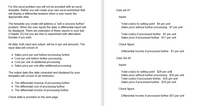
Database System Concepts
7th Edition
ISBN: 9780078022159
Author: Abraham Silberschatz Professor, Henry F. Korth, S. Sudarshan
Publisher: McGraw-Hill Education
expand_more
expand_more
format_list_bulleted
Concept explainers
Question
I attached a picture of the instructions for the excel accounting problem. Please help me understand how to make an excel worksheet with the given information.

Transcribed Image Text:## Excel Differential Analysis Problem
### Objective:
For this Excel problem, you will not be provided with an Excel template. Instead, you will create your own Excel worksheet that will perform a differential analysis when a user inputs the appropriate data.
### Task:
- **Create a Differential Analysis Worksheet:**
- The template you create will address a “sell or process further” problem.
- When the user inputs the data, a differential report will be displayed. There are examples of these reports in your text (Chapter 25); however, you are free to experiment with alternative formats if you wish.
### Data Requirements:
- **Input Data:**
- All data, both input and output, will be in per unit amounts. The input data will consist of:
- Sales price per unit before processing further
- Cost per unit before further processing
- Cost per unit of additional processing
- Sales price per unit after additional processing
- **Output Data:**
- The output data (the data computed and displayed by your template) will consist of (at minimum):
- The differential revenue of processing further
- The differential cost of processing further
- The differential income of processing further
### Check Data:
Check data is provided below:
#### Data Set #1
- **Inputs:**
- Total cost(s) to selling point: $4 per unit
- Sales price without further processing: $7 per unit
- Total cost(s) if processed further: $7 per unit
- Sales price if processed further: $11 per unit
- **Check Figure:**
- Differential Income if processed further: $1 per unit
#### Data Set #2
- **Inputs:**
- Total cost(s) to selling point: $28 per unit
- Sales price without further processing: $30 per unit
- Total cost(s) if processed further: $34 per unit
- Sales price if processed further: $35 per unit
- **Check Figure:**
- Differential Income if processed further: ($1) per unit
### Instructions:
Use the provided data sets to verify that your Excel worksheet correctly calculates the differential income for a “sell or process further” decision. Experiment with different formats and structure your worksheet effectively to make the input and output data clear and easy to understand.
Expert Solution
This question has been solved!
Explore an expertly crafted, step-by-step solution for a thorough understanding of key concepts.
This is a popular solution
Trending nowThis is a popular solution!
Step by stepSolved in 3 steps with 4 images

Knowledge Booster
Learn more about
Need a deep-dive on the concept behind this application? Look no further. Learn more about this topic, computer-science and related others by exploring similar questions and additional content below.Similar questions
- Question 3 Create a scenario involving a definite repetition structure and some input validation. Provide a flowchart that designs the solution to your scenario. Note: your flowchart should include this type of content: ..some statements count = 1 y countarrow_forwardfx 1/1/2028 A 1 Monthly Close Date 1/1/2028 A2 23 4 5 6 868 9 10 11 12 B C A manager would like to repeat a series of dates for the year in Excel to support an automated Process that happens once a month on the first day of the month. Given the spreadsheet shown, what are the next steps to complete this task? While in cell A2, hold the shift key and press the down arrow. O Enter '2/1/2028' in cell A3. Select both A2 and A3 and drag the fill handle down. Enter '2/1/2028' in cell A3. Select A3 and drag the fill handle down. Click on the fill handle in cell A2 and drag down.arrow_forwardBefore sending a PowerPoint presentation to the professor for approval, I'd want to have the APA citations and references verified one more time.arrow_forwardA table lists all the requirements and the status of each to requirement to make sure that all the requirements are addressed. What is it? Requirement traceability matrix O a. Requirement analysis Ob. Requirement collection Oc. Od Requirement specificationarrow_forwardHow the Use of the INDEX function to search for data in a sorted list, be useful and applicable in business and other transactions?arrow_forwardarrow_back_iosarrow_forward_ios
Recommended textbooks for you
 Database System ConceptsComputer ScienceISBN:9780078022159Author:Abraham Silberschatz Professor, Henry F. Korth, S. SudarshanPublisher:McGraw-Hill Education
Database System ConceptsComputer ScienceISBN:9780078022159Author:Abraham Silberschatz Professor, Henry F. Korth, S. SudarshanPublisher:McGraw-Hill Education Starting Out with Python (4th Edition)Computer ScienceISBN:9780134444321Author:Tony GaddisPublisher:PEARSON
Starting Out with Python (4th Edition)Computer ScienceISBN:9780134444321Author:Tony GaddisPublisher:PEARSON Digital Fundamentals (11th Edition)Computer ScienceISBN:9780132737968Author:Thomas L. FloydPublisher:PEARSON
Digital Fundamentals (11th Edition)Computer ScienceISBN:9780132737968Author:Thomas L. FloydPublisher:PEARSON C How to Program (8th Edition)Computer ScienceISBN:9780133976892Author:Paul J. Deitel, Harvey DeitelPublisher:PEARSON
C How to Program (8th Edition)Computer ScienceISBN:9780133976892Author:Paul J. Deitel, Harvey DeitelPublisher:PEARSON Database Systems: Design, Implementation, & Manag...Computer ScienceISBN:9781337627900Author:Carlos Coronel, Steven MorrisPublisher:Cengage Learning
Database Systems: Design, Implementation, & Manag...Computer ScienceISBN:9781337627900Author:Carlos Coronel, Steven MorrisPublisher:Cengage Learning Programmable Logic ControllersComputer ScienceISBN:9780073373843Author:Frank D. PetruzellaPublisher:McGraw-Hill Education
Programmable Logic ControllersComputer ScienceISBN:9780073373843Author:Frank D. PetruzellaPublisher:McGraw-Hill Education

Database System Concepts
Computer Science
ISBN:9780078022159
Author:Abraham Silberschatz Professor, Henry F. Korth, S. Sudarshan
Publisher:McGraw-Hill Education

Starting Out with Python (4th Edition)
Computer Science
ISBN:9780134444321
Author:Tony Gaddis
Publisher:PEARSON

Digital Fundamentals (11th Edition)
Computer Science
ISBN:9780132737968
Author:Thomas L. Floyd
Publisher:PEARSON

C How to Program (8th Edition)
Computer Science
ISBN:9780133976892
Author:Paul J. Deitel, Harvey Deitel
Publisher:PEARSON

Database Systems: Design, Implementation, & Manag...
Computer Science
ISBN:9781337627900
Author:Carlos Coronel, Steven Morris
Publisher:Cengage Learning

Programmable Logic Controllers
Computer Science
ISBN:9780073373843
Author:Frank D. Petruzella
Publisher:McGraw-Hill Education